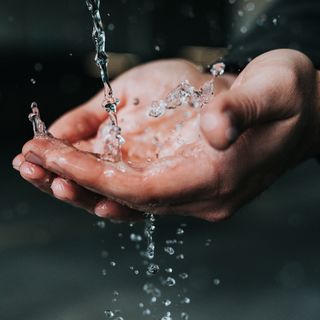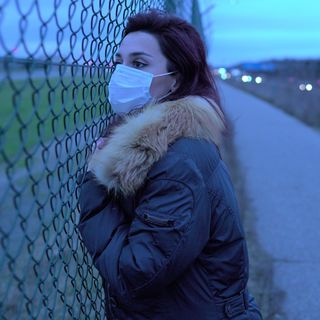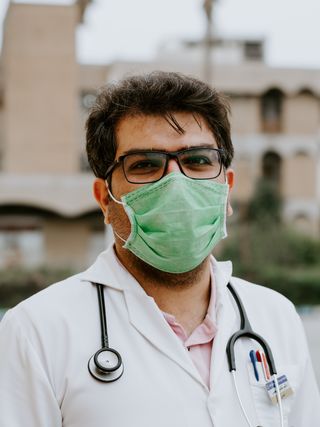Anxiety
Do You Need a Hug? I Do: Anxiety in the COVID-19 Pandemic
Touch is essential to mental and physical health, but we've distanced ourselves.
Posted March 26, 2020 Reviewed by Jessica Schrader
We’re all anxious now.
COVID-19 occupies the lips and ears of everyone. A threat we understand causes us to feel afraid and results in planning an appropriate response, but anxiety comes from the unknown, from the uncertainty of how to make ourselves safe. Separation from loved ones, the loss of freedoms we have taken for granted, uncertainty about risks, and boredom all can cause dramatic consequences.

By now we should all know the basics: Take your temperature twice a day, and if you have a fever or difficulty breathing, consult your doctor. Wash your hands for twenty seconds. Clean all hard surfaces with a household cleaning product. Avoid touching your eyes, nose, and mouth, and cover your mouth when you cough. Stay 6 feet away from any other person.
It’s this separation from others that creates some of our biggest problems. New studies show that from the prenatal period to dwindling old age, touch is important to our physical and mental well being. But let’s be honest about it: Our constant preoccupation with cell phones has been distancing us from each other long before the COVID-19 pandemic. What I miss most during this sheltering-in-place experience are the hugs with the people I care so much about. Not knowing when—or even if—we will be able to give and get those hugs again escalates those feelings of loss.
My husband and I have made a commitment to each other that when the first of us dies, the survivor would hold the dying partner until he passes, but death from this malignant virus might interfere with our commitment. Either of us could die alone, never saying that last goodbye, attended only by people wearing masks, gowns, and gloves in a sterile and sterilized environment.

What can we do to allay our anxiety? First, we must work every day to make sure we express our feelings for each other and to work to resolve any tension that arises between us. Some of us will be forced to grieve, and unresolved conflict complicates the grieving process.
Our cellphones now have been converted from a luxury item to a necessity and activating our network of people we care about is critical. If you have a conflict with someone, call them and tell them it is no longer important. Even if you’re estranged from your family, call them and tell them you wish them good health.
Here are some other things I think are important:
1. Trust experts, not politicians. Experts understand human costs; politicians focus primarily on economic costs and their re-election.
2. Limit your exposure to reliable news. Choose a good newspaper and a trustworthy radio or TV station but turn it off after you’ve received an update.
3. Confront your worries with facts. I’m so worried about (insert your favorite worry here), but here is what I know to be true based on the information from those who know more than I do about this. If you focus only on the worry, you will magnify the negative and minimize the positive, and the worry becomes a cancer that grows and metastasizes.
4. Develop a daily schedule, even though you may not have one now. Block out your day in two-hour intervals, have one major activity in each block, and don’t allow yourself to be distracted from it. One of my patients once told me, “I love my job because it gives me a focus for my discontents.” We need to create a structure for our lives.

5. Do whatever you can to support those people in the front lines of this fight against the virus. Some will be required to decide which patient gets a respirator and which will die. They will suffer the most both during this crisis and after it passes.
6. Tip generously if you stop for a drive-up for coffee or a take-out dinner.
7. Shop for a week, not for a month. If you’re headed to the store, call your neighbors to see if they need anything that you can leave on their doorstep when you return. Abundantly thank those who serve you and put their own lives at risk.
8. Stop checking to see if your 401(k) is now a 201(k), and turn your attention to those who have no responsibility for this crisis but will suffer the most. Altruism is healing.
9. Start or continue to manage your health with diet, exercise, and adequate sleep. Go outside. Inhale the spring air. Listen to the cardinals sing. Walk your dog. Twice. Because you need it more than the dog does. Remember spring always brings renewal even after the fiercest of winters.
10. Pray to someone or something.
11. Listen to “meditation music” on your favorite internet streaming service.

12. Borrow hope from someone if you don’t have any, and if you have an abundance, share it with someone.
You are giving a gift to others by isolating yourself, a sacrifice of personal liberties for the wider public good. We will recover from this into a world that has changed. Perhaps it will help us realize that what is truly important is our relationships with others. Then we can put those cellphones away and return to hugging the people we care most about.
Read an excerpt from Finally Out: Letting Go of Living Straight.




